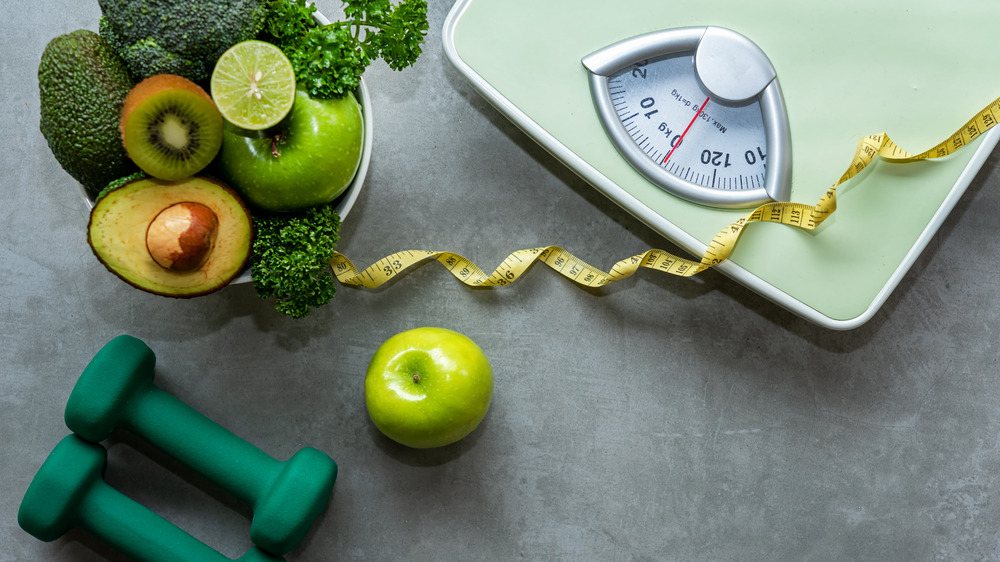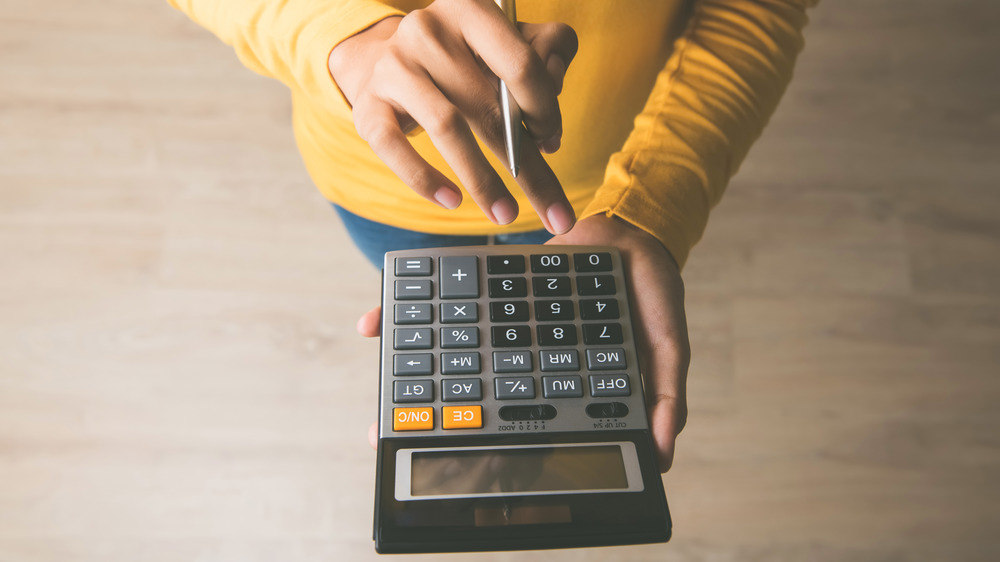Jillian Michaels Reveals The Truth About Counting Calories For Weight Loss
If you made a 2021 New Year's resolution that involved weight loss, you're not alone. According to a YouGov poll, much like last year, the top two resolutions made just a few weeks ago were exercising more and losing weight. According to a report in Forbes that analyzed various research on the efficacy of these annual promises we make to ourselves, nearly one-third of resolutions are already abandoned after a month. As that date quickly approaches, chances are the fad diet you swore would be so easy to stick to has slowly been replaced with the convenience and comfort of our less-than-healthy eating habits.
Instead of beating yourself up about it, and starting the cycle of yo-yo dieting and negative self-talk, take the advice of someone who's been there before — and triumphed against the societal normalization of an unhealthy lifestyle. That person is Jillian Michaels. She isn't just the creator of The Fitness App and an expert in all things health and wellness, she's the G.O.A.T. when it comes to delivering results and telling it like it is.
We were lucky enough to talk exclusively with her about what it takes to actually lose weight and keep it off, including the currently taboo trend of counting calories. She revealed to us in no uncertain terms, "if you want results, do yourself a favor and adhere to the simple science of weight loss — calories in / calories out. And anyone who tells you otherwise is uneducated or unscrupulous."
Jillian Michaels: If your goal is to lose weight, calorie consumption matters
It's popular among influencers and the body positive movement to preach that if you are fueling your body with healthy, "clean" foods, calories don't matter. But Michaels explained, "calories DO matter when it comes to weight loss, weight gain, and weight maintenance. It's ridiculous and disappointing to say the least, that simple biological facts can be publicly denied based on political correctness."
It comes down to basic math. Michaels notes, "Calories in our food are units of energy. When we consume more energy (calories) than our bodies need in a day we store that excess fuel (calories) as fat. That is what fat is — stored energy."
Here's where it gets controversial. Jillian adds, "the types of calories don't really matter that much when it comes to your weight. The quality of your food has a dramatic impact on your health, but a calorie is a unit of energy regardless of its source." One more time ... a calorie is a calorie regardless if it comes from a cucumber or a piece of chocolate. Michaels puts it simply, "You can eat the healthiest foods in the world, but if you overeat them you will store the energy in them you don't burn off as fat."
The first step to weight loss is figuring out how many calories you burn in a day, per Michaels
Not surprisingly, weight loss comes back to math again. According to Michaels, "To lose a pound of fat, you must create a deficit of roughly 3,500 calories." But before you can do that, you need to figure out how many calories you are burning every day.
The first thing you need to do is "calculate your BMR or Basal Metabolic Rate," she explains. "Your basal metabolic rate refers to the amount of calories your body uses for involuntary bodily functions — basically when you are asleep or at rest." To do that, use the following formula. For women: BMR = 655 + (4.35 x weight in pounds ) + ( 4.7 x height in inches ) – ( 4.7 x age in years ). For men: BMR = 66 + (6.23 x weight in pounds ) + ( 12.7 x height in inches ) – (6.8 x age in years ). It's important to note here that according to Michaels, if you have a hormonal disorder or have insulin resistance you need to see an endocrinologist for blood work because the basic BMR calculations won't take those factors into account.
You're not done yet, however. The BMR calculation does not, as Jillian explains, "take into account the amount of calories you'll burn from your daily activity, though. That's your AMR or active metabolic rate." And it's the next step.
How to calculate your active metabolic rate, per Michaels
This calculation is much more straightforward than BMR. You simply need to identify which of the following categories you fall into, take the number attached to that category and multiply by your BMR number.
The lifestyle categories, according to Michaels, are as follows: "If you are chained to your desk and sedentary most of your day you are a 1.1." The next category of lifestyles are the 1.2, "mildly active." Michaels gives examples of this lifestyle group as, "housewives, retail sales people, basically folks who are on their feet throughout the day, but not exerting themselves as a part of their jobs."
The last two groups include, those that "are active and on your feet moving at a fast pace." Michaels details that if that sounds familiar, "you are a 1.3. I fall into this category as most trainers would. So might a plumber or an electrician. This applies to those that are up, moving, exerting energy, but not doing so an extreme amount." And finally, "if you are extremely physically active you are a 1.4. Construction workers, professional athletes ... anyone who is constantly exerting themselves throughout the course of their day."
Now that you know your category number, multiply it with your BMR number, and the result will be your AMR.
Exercise plays a major role in weight loss, says Jillian Michaels
You now have this daily caloric number to work with, but what do you do with it? Taking the example of a 1,700 per day AMR calculation, Michaels illustrates: "If you have really cut back your calorie intake and are presumably consuming 1,500 calories a day (which is low, but still very healthy) — given the math you would only have a deficit of 200 calories a day. At this rate it would take you 18 days to lose 1 pound. And this can be super-discouraging for people. However, if you are working out we can speed the process up significantly by greatly increasing your daily calorie expenditure."
And here's how exercise plays into weight loss. According to Michaels, "If you are training effectively then you should add an additional calorie burn of 10 calories a minute as a medium-sized female and 15 calories a minute as a medium-sized male." That means 30 minutes of what Michaels calls "focused training" would yield a 300 calorie burn, which you would then add to your AMR making it 2,000. Suddenly your calorie deficit jumps because of your exercise! And it gets better, there's an "after-burn effect," as Michaels calls it. That means, at rest, those exercised muscles from your workout, will burn an additional 150 calories over the next 24 hours.
Not all exercise is created equal, according to Michaels
When it comes to getting the most calorie burn from your workout, not all training sessions do the same thing. Waking up and holding a plank for 30 seconds followed by 50 military jacks might have your heart rate pumping, but it's not going to create the 10 calorie a minute burn you're looking for to increase a deficit for weight loss .
If you don't know where to start when it comes to an exercise regimen and "focused training," don't worry. It's a no-brainer if you download Michael's The Fitness App. She explained to us, "All of the workouts I create for The Fitness App are designed to maximize calorie burn and fat metabolism." That means you get a workout that guarantees a maximized calorie deficit as long as you are adhering to a diet with regimented calorie consumption based on your AMR.
So basically, you've got the calories in / calories out solution to weight loss, combined with the workout regimen of an expert celebrity trainer. Or as Michaels explains, "Once you know what you are burning in a day you hold all the cards. You can control how much weight you lose, by how many calories you burn. You can manage your weight by matching your calorie intake to your daily calorie burn. And you can prevent future weight gain by not eating over your daily calorie burn."
Always keep your eye on overall good health, recommends Michaels
At a fundamental level, the goal of weight loss should always be with an end result of improved health. That's why it's a lifestyle and not just a temporary diet. That being said, Michaels stresses, that while a calorie is a calorie regardless of where it comes from, "food quality does count over time."
She adds, "Obviously your metabolism is simply your biochemistry, and crappy overly processed chemical laden foods will definitely mess up your metabolism if you don't eat clean. The golden rule here is 80 / 20. Make 80 percent of your daily calories healthy foods and 20 percent can be treat foods (wine, burger, cookie etc.)."
Consider it this way, it takes a lot more broccoli to hit 100 calories than it does French fries, but an overly restricted eating lifestyle isn't necessarily sustainable, and sometimes you just want to hit the drive-thru, and that's okay. Following Michaels' mantra, you don't need "to eat perfectly," but you do need to eat mindfully. Factor in where your calories come from and as she explains succinctly, "Don't overeat more calories than you burn in a day and use common sense with your food choices."
Jillian Michaels is offering The List readers an exclusive promotion — sign up today to get a 3-month subscription to Jillian Michaels' The Fitness App for $19.99 (normally $44.97).
If you click a link and buy a product or service from a merchant, we may be paid an affiliate commission.






